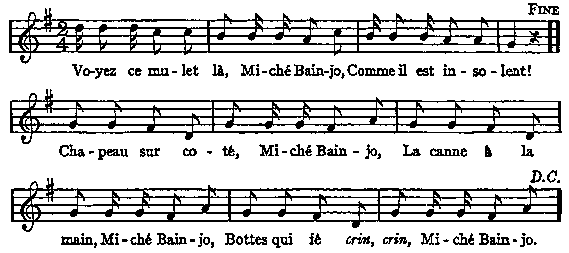ON THE TRAIL OF NEGRO FOLK-SONGS
A Collection Of Negro Traditional & Folk Songs with Sheet Music Lyrics & Commentaries - online book
| Share page | Visit Us On FB |
|
DANCE-SONGS OR REELS |
119 |
||
|
Another instrument which they used sometimes was the "reed-pipe" or "quill." Mr. Krehbiel gave a "quill tune," which a gentleman from Alabama furnished him.
The dance-songs of the Creoles are mostly nonsensical, but the music is haunting and wild, with a sensuous appeal appropriate to their dances.
One favorite dance-song was a senseless, interminable repetition of a line, "Quand papete la cuite na va mange li!" meaning "When the sweet potato is cooked, we shall" eat it," according to one authority, and according to Cable, "When that 'tater Js cooked don't you eat it up!" Either way, there is little charm to the words, but the air has its wild appeal. It is repeated over and over and over. This is a song for the bamboula dance.
In "Slave Songs of the United States " is printed a Creole slave song from Louisiana, making fun of a dandy Negro, which is also a bamboula. |
|||
|
VOYEZ CE MULET LA |
|||
|
|
|||
 |
|||
|
Voyez ce mulet la, Mich6 Bain jo,
Comme il est insolent! Chapeau sur cot6, Michi Bainjo, La canne a la main, Miche Bainjo, Bottes qui fe crin, crin, Miche* Bainjo. Voyez ce mulet la, Miche Bainjo,
Comme il est insolent! |
|||
|
This, roughly translated, means: |
|||
|
|
|||
|
Look at that darky there, Mr. Banjo,
Does n't he strut about 1 Hat cocked on one side, Mr. Banjo, |
|||